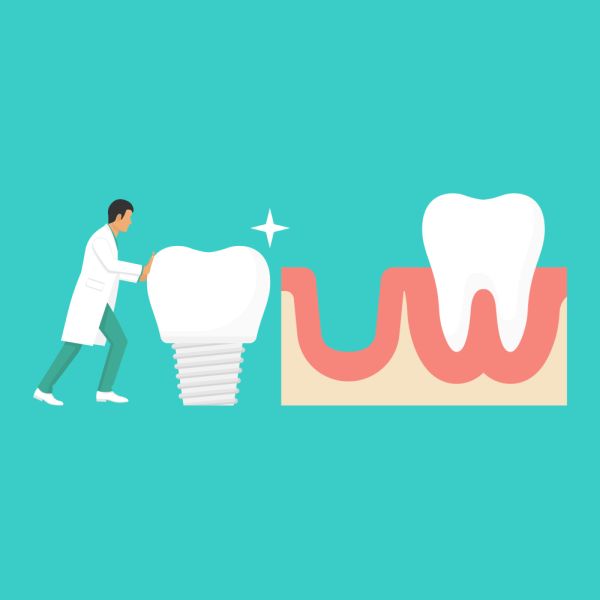How Soon Can I Get New Teeth on Implants?

Dental implants provide an alternative to dentures and dental bridges when it comes to replacing missing teeth. The process involves fusing titanium posts, which act as tooth roots, to the jaw and placing an artificial tooth to the abutment that is attached to the post. The implants hold the artificial teeth in place and also stimulate bone growth in the jaw.
How long does it take before new teeth can be installed on implants?
The answer to this question depends on if the patient is getting regular dental implants or mini dental implants.
Dental implants
If the patient is getting regular dental implants, the entire process takes months to complete. After the patient’s mouth has been examined by their oral surgeon and the oral surgeon determines there is sufficient bone density to hold the implant in place and the patient’s gums are healthy enough for the procedure, the oral surgeon will proceed with the surgery.
The first step in the dental implant surgery procedure is to fuse the titanium post to the jaw, which means the surgeon will cut open the patient’s gums and drill holes in the jawbone where the implant will be placed. After the implant has been placed in the jawbone, the patient has to wait until the jawbone grows into and unites with the surface of the dental implant, which can take several months.
Once the bone has grown around the implant to hold it in place and the gums are healed, the surgeon will place an abutment, the piece where the crown will eventually attach, on the implant. If surgery is needed to place the abutment, the patient will have to wait for a few weeks for the gums to heal. After the gum heals, the artificial tooth will then be attached to the abutment to complete the process.
Mini dental implants
Mini dental implants are typically used when the patient does not have the bone density to support a regular implant. The implants have the same structure as dental implants but are slightly smaller and do not require extensive surgery. Instead of the titanium post being fused to the jawbone, the mini dental implants are placed in the lower jaw with the help of diagnostic imaging tools, which help the surgeon mark the proper locations for the implants.
Once the surgeon has marked the proper locations for the mini implants, they will use a drill to create small holes in the tissue before inserting the implants and holding them in place with drivers and wrenches. After the mini implants have been placed, the surgeon will then fit the dentures with metal housings, allowing it to snap onto the head of the implants, holding the dentures securely in place. Since the dentures used on mini dental implants are attached to the implants before they are fused to the jaw, the patient does not have to go back to the oral surgeon after the procedure is over to get the teeth attached to the implants
Conclusion
Getting an artificial tooth attached to a dental implant can be done before the implant is fused to the jaw or months after, depending on the type of dental implant your oral surgeon uses to replace your missing teeth. If you are interested in getting dental implants, schedule an appointment with your oral surgeon to determine which type is right for you.
Request an appointment here: https://www.drroberttamaki.com or call Dr. Robert B Tamaki, DDS at (310) 402-0156 for an appointment in our Los Angeles office.
Check out what others are saying about our services on Yelp: Read our Yelp reviews.
Related Posts
Implant-supported dentures provide a stable, functional, and natural-looking option for individuals seeking an advanced tooth-replacement solution. These restorations rely on dental implants for support, offering improved comfort and performance compared to traditional removable dentures. The following guide will walk you through implant-supported dentures and what you can expect through the treatment process.Implant-supported dentures are prosthetic…
Many people wonder when to call an emergency dentist for cuts, tears, or bites to the lips, cheeks, tongue, and gums. While these soft tissue injuries can look scary, prompt dental care can protect comfort, reduce infection risk, and save teeth. A general or family dentist who handles urgent cases can guide this care right…
Root canal therapy is often the final step in saving a severely damaged or infected tooth. However, in most cases, a general dentist will recommend placing a dental crown after root canal therapy to contribute to your long-term oral health. This restoration strengthens and protects the treated tooth, helping the tooth to maintain its function,…
Jaw pain, headaches, and difficulty chewing can severely impact daily life. Fortunately, a TMJ dentist offers specialized care to diagnose and treat disorders of the temporomandibular joint (TMJ), providing relief and restoring comfort. These dental professionals specialize in identifying the underlying causes of TMJ disorders and developing treatment plans tailored to your specific needs.The temporomandibular…
